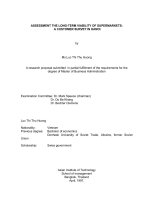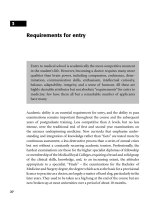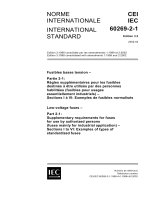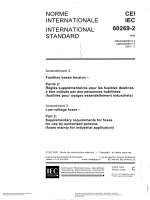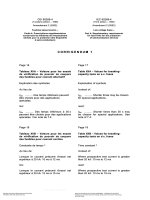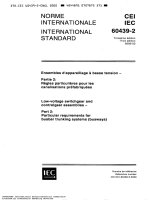Requirements for entry
Bạn đang xem bản rút gọn của tài liệu. Xem và tải ngay bản đầy đủ của tài liệu tại đây (631.58 KB, 22 trang )
Academic ability is an essential requirement for entry, and the ability to pass
examinations remains important throughout the course and the subsequent
years of postgraduate training. Less competitive than A levels, but no less
intense, were the traditional end of first and second year examinations on
the sciences underpinning medicine. New curricula that emphasise under-
standing and integration of knowledge rather than “facts” are tested more by
continuous assessment, a less destructive process than a series of annual crises
but not without a constantly recurring academic tension. Professionally, the
hardest examinations are those for the higher specialist diplomas of fellowship
or membership of the Medical Royal Colleges, requiring a broad and solid grasp
of the clinical skills, knowledge, and, to an increasing extent, the attitudes
appropriate to a specialist. “Finals” – the examinations for the Bachelor of
Medicine and Surgery degree, the degree which acts as the basis for a provisional
licence to practise as a doctor, are largely a matter of hard slog, particularly in the
later years. They used to be taken as a big bang at the end of the course but are
now broken up at most universities over a period of about 18 months.
3
Requirements for entry
27
Entry to medical school is academically the most competitive moment
in the student’s life. However, becoming a doctor requires many more
qualities than brain power, including compassion, endurance, deter-
mination, communication skills, enthusiasm, intellectual curiosity,
balance, adaptability, integrity, and a sense of humour. All these are
highly desirable attributes but not absolute “requirements” for entry to
medicine: few have them all but a remarkable number of applicants
have many.
Broader requirements
Although all doctors need to be bright (not less perhaps than what it takes
to get three B grades at A level at first attempt), medicine needs a great deal
more than academic ability. Applicants must not forget that chances of suc-
cess in the admissions process rest as much on additional skills – ability to
communicate, empathy and integrity – as they do on academic prowess. Any
admissions tutor will be looking to assess your awareness of the qualities
that any good doctor requires. Dr Phillip Hay of St George’s summarises
these attributes as:
• knowledge and understanding
• proficiency in basic clinical skills
• attitudes necessary for good medical practice and patient care
• intellectual curiosity and critical skills
• good teamwork
• lifelong learning
• robustness
• thoroughness
• awareness of own limitations
• open-mindedness
• reflectiveness
• cultural awareness
• sensitivity to life-cycle changes.
The only way of achieving such awareness is work experience. Whether you
volunteer in a nursing home, shadow your local GP, visit a hospital and talk
to staff, or care for an elderly or disabled relative, you should come away
with a clear and realistic perspective of what illness can mean for patient and
for doctor.
For more information on volunteering and practical experience, see the
list of addresses in Appendix 4.
The ability to communicate well, to work in a team with a confident but
not arrogant manner, and to be prepared as need arises to lead and take
responsibility is important too. A sense of humour sprinkles oil on the
wheels of communication.
Endurance, determination, and perseverance are part of the same package.
They feed on dual enthusiasm for science and for the healing art of medicine.
28 Learning medicine
They are inspired by curiosity and enriched by sparks of initiative and
originality. Lord Moran (Dean of St Mary’s and Winston Churchill’s doctor)
once said, “The student who is not curious is surely no student at all; he is
already old, and his thoughts are borrowed thoughts”.
Becoming a doctor is not as formidable as it sounds, given good friends,
teachers, and opportunities to learn, but it requires solid organisation of
time and life and being self-propelled. Desirable characteristics for medicine
do not end here. Balance is needed; balance which comes from an intellec-
tual and personal life is broader and deeper than academic success alone.
Prof. David Greenfield, first Dean of the University of Nottingham Medical
School, referred to “balance of scientific and clinical excellence, humanitar-
ian and compassionate concern … balance of service and learning, balance
of current competence and future adaptability”. Other interests – literary,
musical, artistic, and sporting – encourage achievement, provide recreation,
and demand application, enthusiasm, and ability. They can become great
stabilisers and good points of communication with both colleagues and
29 Requirements for entry
patients. For a female accident and emergency consultant, to also be the
medical officer for a well-known football club (not that she is a great player)
is good for her and for her hospital.
Then there is the invaluable down-to-earth ability to organise and to
cope; a capable pair of hands and a reassuring attitude of “leave it to me and
I’ll sort it out”, taking huge weights off shoulders and loads off minds. Sir
George Pickering, one-time Regius Professor of Medicine at Oxford, wrote,
“Medicine is in some ways the most personal and responsible profession: the
patient entrusts his life and wellbeing to his doctor. Thus, the character and
personality of the doctor, his sympathy and understanding, his sense of
responsibility, his selflessness are as important as his scientific and technical
knowledge”. He also pointed out that a doctor neither needs to nor should
try to sort out every problem him or herself: “the best doctors know to
whom to turn for help”.
Many medical schools, when asked which qualities they regarded as most
important in applicants to medicine, highlighted the desirability of a realis-
tic understanding of what is demanded in the study of medicine and in the
subsequent career. Without this embryo insight, many years of unhappiness
may lie ahead, however bright and however gifted the student. Failure to
understand the demands of the job and the limitations of the art may
explain why some doctors drop out of medicine.
Applicants from medical backgrounds have an advantage in this respect.
They have seen the effects of the career on their parents and families, and
have had the opportunity to explore what their parent or parents do; they
also have relatively easy access to observing other medical specialities. All the
more regrettable if they have not taken this opportunity to find out what it
is all about. For others, it is much more difficult. Most television medical
programmes glamorise and trivialise, and give little insight into the every-
day undramatic life of a doctor. The BBC TV series Doctors to Be and Doctors
At Large, following students through their years at St Mary’s, and now for
20 years into their careers, are an exception and offer useful insights, even if
the structure of the course itself has now changed. The rather embattled and
disillusioned group of new doctors at the end of the first series has now been
balanced by glimpses of where they are now, 10 years on, and reveals that
they feel that it has all been worthwhile. A 20-year follow-up is now in
preparation. As this is one of the most fundamental aspects of making an
30 Learning medicine
informed personal decision Learning Medicine puts less emphasis on the
years in medical school and more on where they lead.
Personal health requirements and disability
A doctor’s overriding responsibility is the safety and well-being of
patients. As such all applicants to medical school must have the potential
to function as a fully competent doctor and fulfil the rigorous demands of
professional fitness to practise as stated by the General Medical Council.
All applicants must therefore disclose any disabilities or medical condi-
tions on the application form as they may affect the ability to practise
medicine. This may be by placing patients at risk of infection, being
unable to perform necessary medical procedures, or by impairing your
judgement. Similarly, applicants must also complete a declaration that
they have no criminal convictions or pending prosecutions, in line with
national policies for staff working in sensitive roles. In most circumstances
a declaration does not automatically disqualify an applicant but will allow
the case to be decided on its own merits.
The UK Department of Health has requirements for specific conditions,
which means that a student cannot be admitted with active tuberculosis
or if infectious with hepatitis B, until they can be proven to be no longer infec-
tious. In the case of hepatitis B, all prospective students must show proof of
adequate immunisation before commencing the course. You will be asked for
documentary proof when you arrive at medical school. Your own general prac-
titioner (GP) can usually arrange for hepatitis B immunisation to be carried
out. The course and testing for a satisfactory response can take up to 9 months,
so you should discuss this with your GP at the earliest opportunity. If there is a
failure to respond to the immunisation a student will be expected to prove that
they are not infectious. In these rare circumstances, or where a student tests
positive for any of the hepatitis B antigens, they should discuss this with their
GP and the admissions tutor of their preferred school, as soon as possible.
There is no clear national policy as yet about candidates who are known
to be hepatitis C positive. However, this must be declared on the UCAS
form, and individual schools will advise in this rare instance. In any event,
failure to disclose any condition that puts patients at risk will result in
immediate dismissal from medical school.
31 Requirements for entry
All students are advised to be immunised against meningococcal menin-
gitis before starting at university.
Any disability should also be disclosed and will be dealt with by the
schools on a case-by-case basis. Dyslexia should also be disclosed on the
UCAS form and this will need to be supported by a formal statement from
a suitably qualified psychologist. Most medical schools will advise relevant
departments of the assistance which may be necessary for students with
dyslexia and will make some time allowances in written examinations, but
no concessions are made in clinical examinations.
Taking illegal drugs or abusing alcohol are also inconsistent with a doctor’s
professional responsibilities, both on patient safety grounds and the need for
personal integrity. Students who ignore their responsibility to be utterly
dependable in this regard put their place in medical school in severe jeopardy.
Academic requirements
Although academic achievement is only the qualifying standard for entering
the real field of selection, like the Olympic qualifying standard is to selection
for the national team, it is overwhelmingly the strongest element in selec-
tion. Unlike all the other desirable attributes of personality, attitude, and
interest examination results look deceptively objective. Relatively objective
they may be but they are still poor indicators of the potential to become
“a good doctor” – a product difficult to define, not least because medicine is
such a wide career that there may be many different sorts of good doctors –
but they all need the appropriate knowledge, skills, and attitudes for effec-
tive medical practice and the ability to use them competently.
Examination results at the age of 18 years do not predict late developers
nor do they take account of differences in educational opportunity at school
nor of support for study at home. Results may also be upset by ill health on
the day; even minor illness or discomfort crucially timed may take the gloss
off the performance, a gloss which may make all the difference between a
place at medical school and no place at all. Having said that, however, those
who fail during the medical course are generally those with the poorest
A level results, and those who do best, especially in the early years with their
greater scientific content, are generally those with the highest. But there are
outstanding exceptions.
32 Learning medicine
33 Requirements for entry
All medical schools set a minimum standard of at least AAB at A level
(Table 3.1 and 3.2). The actual achievement of entrants is very similar at all
universities whatever their target requirements, except Oxford and
Cambridge, where they are higher. Medical schools which set marginally
lower grades leave themselves the flexibility to make allowances for special
situations and to give due weight to outstanding non-academic attributes.
Most successful applicants to medical schools setting a lower minimum sub-
stantially exceed their requirements. It is vital to realise that good grades do
not guarantee a place: far more applicants achieve the necessary grades than
can be given a place.
Chemistry or physical science is required by all universities for medicine.
They prefer this at A level, but practically all of the medical schools in the UK
are prepared to accept AS chemistry in place of A level. Most are prepared to
accept a combination of AS levels in place of another science or mathematics
A level. In practice, AS levels are normally offered in addition to three A levels
and not in substitution for one. Many universities prefer two other science
subjects at A level, taken from the group of physics (unless physical science is
offered), biology, and mathematics, but all are prepared to accept a good grade
in an arts subject in place of one, or in some medical schools, two science sub-
jects. Some medical schools do not accept mathematics and higher mathe-
matics together as two of the required three A level subjects. General studies
A level is generally not acceptable as one of the subjects.
All medical schools are prepared to accept one and sometimes more than
one non-science or mathematics A level.
No particular non-science subjects are favoured but knowledge-based
rather than practical skills-based subjects are generally preferred. It may be
difficult to compare grades in arts and science subjects, so a higher target
may be set for an arts subject for entry to medicine. Several universities
express a preference for biology over physics or mathematics. Chemistry
and biology are the foundations of medical science, especially if the mathe-
matical aspects of those subjects are included. But however useful it is to be
numerate in medicine, especially in research, students without a good
knowledge of biology find themselves handicapped at least in the first year
of the course by their lack of understanding of cell and organ function and
its terminology. They also generally have greater difficulty in expressing
themselves in writing, especially if their first language is not English. Failure
Table 3.1. For applicants with qualifications from England, Wales and Northern Ireland
GCE entry
University requirements A levels AS levels Other Info
Aberdeen AAB Acceptable on its own and combined Acceptable only when combined UKCAT compulsory
with other qualifications. Chemistry with other qualifications.
is highly desirable, plus at least one General Studies excluded.
from Biology, Mathematics or Physics
and one other. General Studies excluded.
Barts, London, AAB Acceptable on its own and combined Acceptable combined with other UKCAT compulsory
Queen Mary with other qualifications. Chemistry or qualifications. Biology at grade B
Biology. General Studies excluded. and Chemistry at grade B required. Graduate entry
General Studies excluded. available
Birmingham AAB Acceptable on its own and combined Acceptable only when combined Graduate entry
with other qualifications. Chemistry with other qualifications. Biology available
and either Biology or Physics or Mathe- at AS level is required if not
matics. Human Biology may be offered, offered at A level. Human Biology
but not in addition to Biology. General may be offered instead of Biology.
Studies excluded.
Brighton and 340 tariff Acceptable on its own and combined Acceptable combined with other UKCAT compulsory
Sussex points with other qualifications. Biology qualifications. Chemistry and
or Chemistry required. General Biology. General Studies
Studies excluded. excluded.
Bristol AAB Acceptable on its own and combined Acceptable combined with other Graduate entry
with other qualifications. Chemistry qualifications. If four AS levels and Pre-Medical
at grade A required. General Studies offered at least one should be in a course available
excluded. non-science subject.
Cambridge AAA Acceptable on its own and combined Acceptable only when combined BMAT compulsory
with other qualifications. One from with other qualifications. Three
